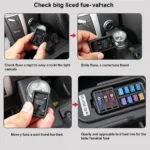An OBD2 scanner, often called an OBD2 code reader, is an essential tool for car owners and mechanics alike. It unlocks the secrets hidden within your car’s computer system, allowing you to diagnose problems, understand performance issues, and even clear pesky warning lights on your dashboard.
What Does an OBD2 Scanner Do?
Think of your car’s computer system as the brain and the OBD2 scanner as a specialized translator. This handy device plugs into your vehicle’s OBD2 port, typically located under the steering wheel, and reads data from the Engine Control Unit (ECU). This data is translated into readable codes and information, providing you with valuable insights into your car’s health and performance.
Deciphering the OBD2 Scanner Definition: Key Features and Functions
While the core function of an OBD2 scanner is to read and clear trouble codes, these devices offer a plethora of features that extend beyond basic diagnostics. Here’s a breakdown of what a typical OBD2 scanner can do:
- Read & Clear Diagnostic Trouble Codes (DTCs): This is the primary function, allowing you to identify the source of those pesky “Check Engine” lights and clear them once resolved.
- View Live Data Stream: Monitor real-time data from various sensors like engine RPM, coolant temperature, oxygen sensor readings, and more. This feature is crucial for identifying intermittent issues and understanding how your engine performs under different conditions.
- Freeze Frame Data: When an error code is triggered, the OBD2 scanner captures a snapshot of the engine’s parameters at that specific moment, giving you valuable clues about the events leading up to the issue.
- Component Testing: Some advanced scanners allow you to run tests on specific components like the EVAP system or oxygen sensors, aiding in more targeted diagnostics.
Types of OBD2 Scanners: Finding the Right Fit for You
The market offers a wide range of OBD2 scanners, each tailored to different needs and budgets.
1. Basic Code Readers:
These entry-level scanners are perfect for DIY enthusiasts who want to read and clear basic trouble codes. They’re typically affordable and easy to use, but lack advanced features like live data streaming.
2. Bluetooth OBD2 Adapters:
These compact devices connect to your smartphone or tablet via Bluetooth, turning your mobile device into a powerful diagnostic tool. They’re an excellent choice for users who prefer a mobile-first experience and access to a wider range of diagnostic apps.
3. Professional-Grade Scan Tools:
These high-end scanners are designed for professional mechanics and workshops. They offer comprehensive diagnostics, advanced programming capabilities, and access to manufacturer-specific codes.
Choosing the Right OBD2 Scanner: Factors to Consider
- Your Skill Level: If you’re a beginner, a basic code reader or a Bluetooth adapter might be sufficient. Professionals, however, benefit from the advanced features of a professional-grade scan tool.
- Vehicle Compatibility: Ensure the scanner you choose is compatible with your vehicle’s make, model, and year.
- Features: Consider the features that are important to you. Do you need live data streaming? Component testing? Make a list of your must-have features before you start shopping.
OBD2 Scanner: An Investment in Your Car’s Health
Understanding the OBD2 scanner definition empowers you to take control of your car’s maintenance. From diagnosing minor issues to gaining deeper insights into your vehicle’s performance, an OBD2 scanner is an invaluable tool. Whether you’re a DIY enthusiast or a seasoned mechanic, choose the right scanner for your needs and unlock the full potential of on-board diagnostics.
FAQs About OBD2 Scanners
1. Where is the OBD2 port located in my car?
The OBD2 port is typically located under the dashboard on the driver’s side, often near the steering column.
2. Can I use any OBD2 scanner on my car?
While most OBD2 scanners work on a wide range of vehicles, it’s essential to ensure compatibility with your car’s make, model, and year.
3. Will using an OBD2 scanner void my car’s warranty?
No, using an OBD2 scanner will not void your car’s warranty.
4. Can I fix my car’s problems with an OBD2 scanner?
An OBD2 scanner helps diagnose problems, but it doesn’t fix them. You’ll need to address the underlying issue identified by the scanner.
5. How often should I use an OBD2 scanner?
It’s a good practice to scan your car for codes periodically, especially if you notice any unusual performance issues or warning lights.
Exploring the World of OBD2 Scanners
Can OBD2 ELM327 Find Car’s Problem?
Best Free OBD2 Android App 2017
Need assistance with choosing the right OBD2 scanner for your needs? Contact us via WhatsApp: +1(641)206-8880, Email: [email protected]. Our 24/7 customer support team is here to help!
